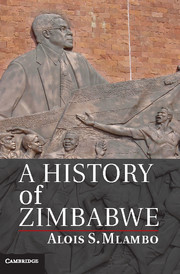Book contents
- Frontmatter
- Dedication
- Contents
- Figures
- Tables
- Maps
- Acknowledgements
- Timeline
- Notable Figures in Zimbabwean History
- 1 Introduction: Zimbabwe in Historical Perspective
- 2 Early States, c. 900–1900
- 3 The British Conquest State
- 4 Colonial Economy and Society to 1953
- 5 The Federation Years, 1953–1963
- 6 Nationalist Movements to 1965
- 7 Unilateral Declaration of Independence and African Response
- 8 Independent Zimbabwe, 1980–2000
- 9 The Crisis Years, 2000–2008
- 10 Conclusion: Zimbabwe Past, Present and Future Prospects
- Select Bibliography
- Index
- References
2 - Early States, c. 900–1900
Published online by Cambridge University Press: 05 June 2014
- Frontmatter
- Dedication
- Contents
- Figures
- Tables
- Maps
- Acknowledgements
- Timeline
- Notable Figures in Zimbabwean History
- 1 Introduction: Zimbabwe in Historical Perspective
- 2 Early States, c. 900–1900
- 3 The British Conquest State
- 4 Colonial Economy and Society to 1953
- 5 The Federation Years, 1953–1963
- 6 Nationalist Movements to 1965
- 7 Unilateral Declaration of Independence and African Response
- 8 Independent Zimbabwe, 1980–2000
- 9 The Crisis Years, 2000–2008
- 10 Conclusion: Zimbabwe Past, Present and Future Prospects
- Select Bibliography
- Index
- References
Summary
Introduction
The colonisation of Africa at the end of the nineteenth century was often justified by claims that the colonised lands were ‘uncivilised’ and inhabited by a barbaric people without any history or, in the case of the South African interior and Zimbabwe, that the land was, in any case, empty and there for the taking. Both alleged attributes of precolonial Africa appear in a statement by the former Rhodesian Prime Minister Ian Smith in 1997, in which he justified the occupation of Zimbabwe by a group known as the Pioneer Column that were sponsored by the arch-imperialist Cecil John Rhodes by claiming that these invaders were
going into uncharted country, the domain of the lion, elephant, the buffalo, the rhinoceros – all deadly killers –the black mamba, the most deadly of all snakes, and the Matabele [sic], with Lobengula’s impis, the most deadly of all black warriors.... But if the mission was to raise the flag for queen and country, no questions were asked. Moreover, their consciences were clear: to the west the Matabeles had recently moved in.... The eastern parts of the country were settled by a number of different tribes, nomadic people who had migrated from the north and east, constantly moving to and fro in order to accommodate their needs and wants. To the south were scattered settlements of Shangaans from Mozambique and Northern Transvaal. Clearly it was no man’s land, as Cecil Rhodes and the politicians back in London had confirmed, so no one could accuse them of trespassing or taking part in an invasion.
- Type
- Chapter
- Information
- A History of Zimbabwe , pp. 8 - 29Publisher: Cambridge University PressPrint publication year: 2014



